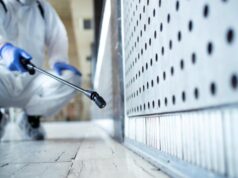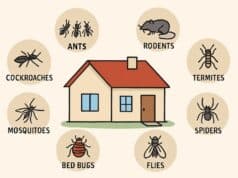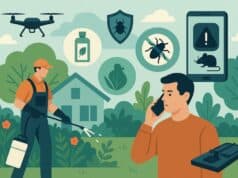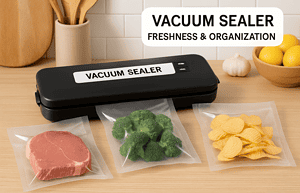
Flea infestations can be tough to deal with, so steps should be taken to prevent their occurrence. They are usually brought into the home by pets; therefore, you must take extra care if you have pets in your residence. As a homeowner, knowing how to deal with or prevent infestations is important. Knowing what to do reduces the number of times you have to call in a professional and the amount you spend on extermination. Here are the top tips on protecting your home against flea infestations.
Maintain a Thorough Cleaning Routine
Maintaining a strong cleaning routine is important for preventing a flea infestation. Declutter your space to make it easier to clean hard-to-reach areas and disinfect appropriately. Carpets, couches, rugs, and other cushioned furniture should be given special attention while cleaning.
Vacuuming during high flea risk periods removes adult fleas, larvae, and eggs. All vacuumed contents should be disposed of outside your home to prevent the spread or contamination. Pet and family beddings should be cleaned regularly with hot, soapy water and dried at high temperatures. If infestation has already occurred, you may need to replace old bedding.
Protect Your Pets
Your pets should undergo veterinarian-approved flea prevention to ensure optimal protection. These prevention processes include oral medications, flea collars, sprays, and topical treatments as recommended by your vet. Using any recommended treatments consistently is crucial, especially if your pets spend time outdoors or play with other animals. Develop the habit of inspecting your pets regularly. Use a flea comb to inspect the fur, especially the tail and neck areas, for any signs of the pests.
Outdoor Flea Prevention
Flea prevention starts from outside your home, as you can take steps to ensure that it does not cross your yard. Fleas flourish in humid and shady conditions, so you should mow and maintain your yard. Ensure your grass is trimmed, leaf litter is cleared, and debris is removed. This exposes your lawn to sunlight, which discourages the habitation of fleas.
You should also avoid overwatering, as fleas love moisture. Keep your lawn as dry as possible by regulating your water usage. Opossums, raccoons, and squirrels are some wild animals that carry fleas. You should restrict wild animals from gaining access to your yard. Remove food sources and seal entry points to discourage visits from these animals.
Use Treatment Solutions
Sprays and powders are the most appropriate solutions for flea pest control. Use recommended sprays/powders for serious infestations. These sprays are designed for indoor use and should be applied under furniture, near pet bedding, and in cracks.
Choose between adulticides and insect growth regulators (IGRs) depending on your needs or consult an expert for advice. You can also consider natural solutions like lemon-based sprays and diluted apple cider vinegar. While they may help deter fleas, evidence of their efficacy is limited and should not be solely relied upon.
Endnote
Following the steps we have explained above will help to keep your pets and home free from fleas. Incorporate regular veterinary visits for your pets to combat any possible infections you may have missed. Furthermore, take care of your yard to ensure fleas do not have a breeding ground. Finally, prevent wild animals like raccoons and opossums from entering your property.








